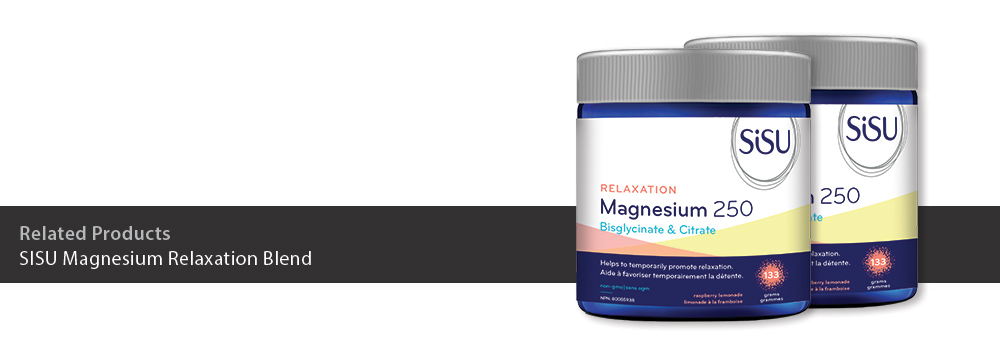

The Right Recipe for Relaxation
When it comes to leading a healthy, well-balanced life, there really is no substitute for a proper diet, adequate rest, and regular physical activity. However, despite our best efforts, many of us still find ourselves struggling to meet the demands of family, friends, and career, often putting any personal needs to the back burner. To help ensure that we’re functioning at our best, physically, mentally and emotionally, it’s often a good idea to incorporate natural supplements into the routine. That said, all-natural supplements are most certainly not created equal, with the variation between them often making the difference between a well-absorbed, well-tolerated, helpful supplement and one that is at best, a waste of money, and at worst, potentially harmful. More specifically, differing brands may use synthetic vs. naturally-sourced ingredients[i], therapeutically beneficial vs. negligible (ie. effectively “useless”) nutrient dosages, nutrient forms that are either poorly or very efficiently absorbed (termed its “bioavailability”)[ii],[iii], or be laden with fillers, preservatives, binders, artificial colours or flavours. That’s why it’s simply not enough to just pick a supplement at random and assume that it’ll make a difference.
One area of particular relevance to this discussion is the subject of stress and anxiety. With prolonged bouts of high stress being closely linked with a host of health concerns including joint pain/arthritis[iv], immune imbalance[v], insomnia, digestive issues, high blood pressure and heart disease[vi], there is a clear need for intervention. That said, many people are reluctant to turn to pharmaceutical solutions for fear of side-effects like sedation, or addictive potential. To make matters worse, a number of natural remedies fall victim to the multitude of issues previously mentioned, using inappropriate dosages of poorly-absorbed nutrients, in a product filled with artificial colours or other undesirable components[vii].
Fortunately, Sisu has sought to address this issue, with its Magnesium Relaxation Formula, a great-tasting, easy-to-mix powder designed to temporarily promote relaxation, gently and safely. An essential mineral involved in literally hundreds of biochemical processes in the body, magnesium plays a key role in everything from energy production and blood pressure regulation to mental-emotional wellness[viii]. But compared with poorly-absorbed forms like magnesium oxide[ix] that may also upset digestion, or less well-researched forms like magnesium malate, each serving of Sisu’s Magnesium Relaxation Formula delivers 250 mg of highly bioavailable magnesium citrate[x] and bisglycinate[xi]. Supplementation with this powerful nutrient has been shown clinically to help alleviate stress and anxiety, without adverse effects[xii]. In addition, Magnesium Relaxation Formula adds two other highly supportive ingredients, GABA, shown to reduce anxiety and promote relaxation[xiii], and L-Theanine, which can help to alleviate stress, improve sleep[xiv] and boost cognitive function[xv]. Finally, it’s naturally-sweetened, made with non-GMO ingredients and free of gluten, making it a safe, non-habit-forming way to help alleviate daily stresses.
While the foundation of healthy living should always include a well-balanced diet and active lifestyle, there will always be moments when we could use a little support. Find a little time for yourself, with Magnesium Relaxation Blend.
[i] Kamath A, Pemminati S. Methylcobalamin in Vitamin B Deficiency: To Give or not to Give?. J Pharmacol Pharmacother. 2017;8(1):33-34.
[ii] Šimoliūnas E, Rinkūnaitė I, Bukelskienė Ž, Bukelskienė V. Bioavailability of Different Vitamin D Oral Supplements in Laboratory Animal Model. Medicina (Kaunas). 2019;55(6)
[iii] Purpura M, Lowery RP, Wilson JM, Mannan H, Münch G, Razmovski-naumovski V. Analysis of different innovative formulations of curcumin for improved relative oral bioavailability in human subjects. Eur J Nutr. 2018;57(3):929-938.
[iv] Burston JJ, Valdes AM, Woodhams SG, et al. The impact of anxiety on chronic musculoskeletal pain and the role of astrocyte activation. Pain. 2019;160(3):658-669.
[v] Moshfegh CM, Elkhatib SK, Collins CW, Kohl AJ, Case AJ. Autonomic and Redox Imbalance Correlates With T-Lymphocyte Inflammation in a Model of Chronic Social Defeat Stress. Front Behav Neurosci. 2019;13:103.
[vi] Ho AK, Thorpe CT, Pandhi N, Palta M, Smith MA, Johnson HM. Association of anxiety and depression with hypertension control: a US multidisciplinary group practice observational study. J Hypertens. 2015;33(11):2215-22.
[vii] Dwyer JT, Coates PM, Smith MJ. Dietary Supplements: Regulatory Challenges and Research Resources. Nutrients. 2018;10(1)
[viii] Gröber U, Schmidt J, Kisters K. Magnesium in Prevention and Therapy. Nutrients. 2015;7(9):8199-226.
[ix] Kappeler D, Heimbeck I, Herpich C, Naue N, Höfler J, Timmer W, et al. Higher bioavailability of magnesium citrate as compared to magnesium oxide shown by evaluation of urinary excretion and serum levels after single-dose administration in a randomized cross-over study. BMC Nutr. 2017.
[x] Lindberg JS, Zobitz MM, Poindexter JR, Pak CY. Magnesium bioavailability from magnesium citrate and magnesium oxide. J Am Coll Nutr. 1990;9(1):48-55.
[xi] Schuette SA, Lashner BA, Janghorbani M. Bioavailability of magnesium diglycinate vs magnesium oxide in patients with ileal resection. JPEN J Parenter Enteral Nutr. 1994;18(5):430-5.
[xii] Boyle NB, Lawton C, Dye L. The Effects of Magnesium Supplementation on Subjective Anxiety and Stress-A Systematic Review. Nutrients. 2017;9(5)
[xiii] Abdou A.M., Higashiguchi S., Horie K., Kim M., Hatta H., Yokogoshi H. Relaxation and immunity enhancement effect of gamma-aminobutyric acid (GABA) administration in humans. BioFactors. 2006;26:201–208.
[xiv] Kim S, Jo K, Hong KB, Han SH, Suh HJ. GABA and l-theanine mixture decreases sleep latency and improves NREM sleep. Pharm Biol. 2019;57(1):65-73.
[xv] Chen SQ, Wang ZS, Ma YX, et al. Neuroprotective Effects and Mechanisms of Tea Bioactive Components in Neurodegenerative Diseases. Molecules. 2018;23(3)
